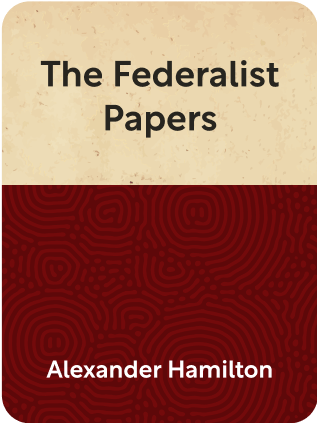

This article is an excerpt from the Shortform summary of "The Federalist Papers" by Alexander Hamilton. Shortform has the world's best summaries of books you should be reading.
Like this article? Sign up for a free trial here .
What was the purpose of The Federalist Papers? Why were they written and how did they help?
The purpose of The Federalist Papers was to advocate for the new U.S. Constitution. The Constitution had created a stronger national government than the Articles of Confederation had done.
Read more about the purpose of The Federalist Papers.
What Was the Purpose of The Federalist Papers?
The purpose of The Federalist Papers was to make the general case for a stronger national government and urge the ratification of the Constitution drafted during the Constitutional Convention held at Philadelphia in 1787. The 85 essays that comprise The Federalist Papers were published in New York City newspapers in a piecemeal fashion between October 1787 and April 1788, while the ratification debate over the new Constitution was taking place in the 13 states.
(Shortform note: Historians are unclear as to what impact The Federalist Papers had on the ratification of the Constitution. New York’s constitutional convention did vote to ratify, but it was the 11th state to do so—the Constitution had only needed nine states to ratify it for it to become law, thus making New York’s vote largely symbolic. Moreover, New York’s convention only approved the Constitution by a razor-thin 30-27 margin, indicating that The Federalist Papers failed to significantly move public opinion, even in the state where they were most heavily published. Outside of New York, they were hardly published at all, further calling into question their effect.
The Merits of the New U.S. Constitution
Nevertheless, they stand as an important analysis of the merits of the Constitution and are widely regarded as essential reading for those interested in the history of American governance.)
They are perhaps our best window into the minds of the men who drafted the Constitution and founded the United States. What was the purpose of The Federalist Papers after the Constitution was ratified? we gain important insight into what the Founding Fathers thought about human nature, civil society, and the relationship between government and liberty.
The framers of the Constitution had a pragmatic, if somewhat negative view of human nature. They believed that people were prone to selfishness and ambition, and that power had a universal tendency to corrupt even the most virtuous individuals. People were by their nature flawed; if they had been perfect, there would be no need for a government to restrain their worst impulses.
Accordingly, they wanted to construct a government that took this view of human nature into account. The purpose of The Federalist Papers was to describe the new government. The structure of the new federal government would be based in laws and political institutions, instead of relying upon the virtue and upright conduct of individuals. These laws and political institutions would be designed to channel the natural tendencies to ambition, self-interest, and faction toward ends that would benefit society as a whole.
Any proper analysis of the purpose of The Federalist Papers must, of course, take into account the historical context in which they were written. The Articles of Confederation, the national legal framework for the Union prior to the adoption of the Constitution, had proven to be a failure:
States had too much power relative to the federal government. As we’ll see, the Articles only acted upon the states in their collective capacities, not upon the actual people of the states. Thus, it was not really a proper national government, but, rather, a loose and ramshackle collection of semi-independent sovereign states. The national government merely presided over this collection of independent states, but exerted no control over them.
The government under the Articles was unable to perform basic functions like:
- Regulating interstate commerce
- Putting down domestic insurrections and protecting the nation against the threat of foreign invasion
- Preventing states from forming their own commercial treaties with foreign powers
- Adequately raising revenue from the states to meet its debt obligations from the Revolutionary War
Moreover, the equal representation of the states in Congress (regardless of population) gave small states disproportionate political power. They could block the passage of legislation on important national priorities for parochial and self-interested reasons.
The weak design of the Articles of Confederation was no accident. Americans at the time greatly feared a strong central government, a legacy of their opposition to King George III and their reading of recent British and American history. They believed that a strong central government, like the monarchical system of Great Britain, would trample upon the liberties they’d fought to secure.
The authors of The Federalist Papers needed to overcome this ingrained political opposition to a strong Union between the states. Alexander Hamilton, James Madison, and John Jay (writing under the collective pseudonym “Publius”) used The Federalist Papers to make the opposite case: that a strong national government was not a threat to liberty; in fact, it was its greatest guarantor.

———End of Preview———
Like what you just read? Read the rest of the world's best summary of Alexander Hamilton's "The Federalist Papers" at Shortform .
Here's what you'll find in our full The Federalist Papers summary :
- The genius of the founding fathers in how they designed the United States Constitution
- Why it was critical for the United States to form a union rather than stay separated as colonies
- How Alexander Hamilton anticipated social issues that are still relevant today





